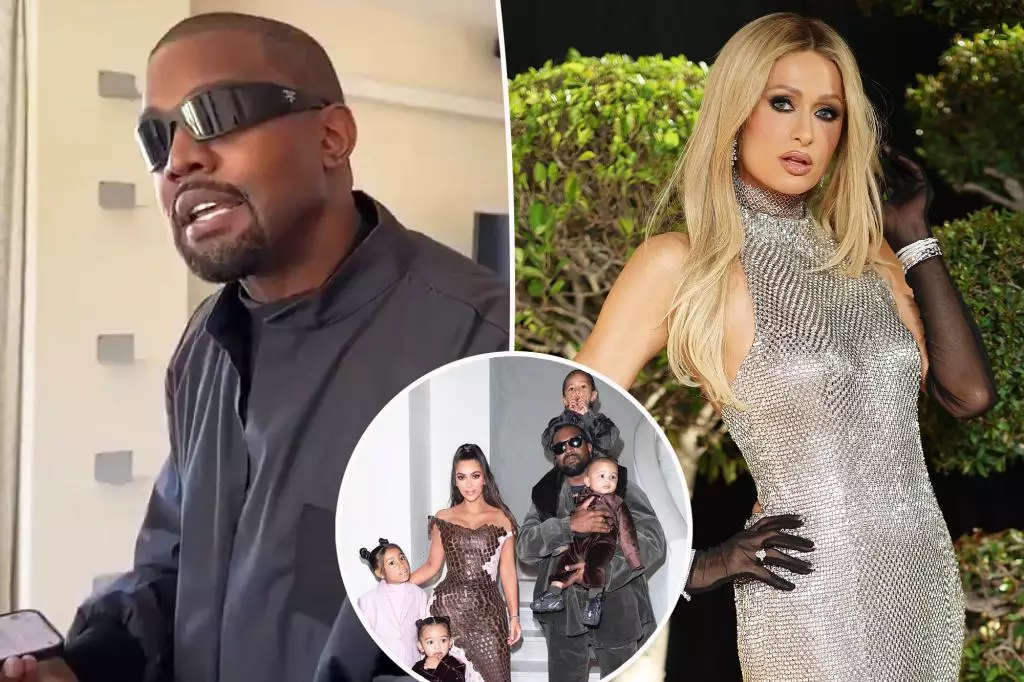In a daring twist of celebrity gossip, Kanye West, who now prefers to be called Ye, recently shocked fans and critics alike with his controversial statement during a Twitch livestream that was abruptly shut down. In this candid moment, Kanye expressed an unusual sentiment: he believed he “should’ve had babies” with Paris Hilton instead of his ex-wife Kim Kardashian. This comment stands out not only for its audacity but also for the implications it carries regarding relationships, legacy, and personal choices in the volatile world of celebrity.
The rapper reminisced about the days when Kardashian was reportedly Hilton’s assistant, casually suggesting that aligning his legacy with Hilton’s hospitality empire would have been more fruitful. Such statements provoke poignant questions about the nature of relationships and the choices one makes within them. Could the hotel royalty of Paris Hilton and the musical genius of Kanye West have produced a synergy potent enough to reshape their respective worlds? Or is this just an off-the-cuff remark reflecting his current frustrations and a desire to provoke?
Childhood Influences and Perceptions of Power
Kanye West’s comments don’t merely reflect a whimsy of desire but also reveal insights into his worldview—one shaped significantly by his experiences and relationships. By equating parenthood with power dynamics, he invoked the well-publicized affair of Arnold Schwarzenegger, hinting at how child custody battles influence personal agency and autonomy. His assertion that his ex-wife Kim Kardashian holds “power” over him because she is the mother of his children encapsulates that perplexing blend of affection and bitterness that often characterizes celebrity relationships.
In the turbulent realm of celebrity parenting, where public personas take precedence over private realities, Kanye’s reflections resonate. They magnify longstanding debates about fathers’ rights, emotional turmoil post-divorce, and societal expectations surrounding masculinity. He has publicly questioned why a “celebrity world” seems to idolize the oppressors—the ones who control the narrative around family dynamics—even as they witness his struggle in real-time. This tension underscores deeper societal questions about fame, parenting roles, and personal accountability.
The Response to Kanye’s Revelations
Moreover, the silence or absence of immediate commentary from representatives of both Paris Hilton and Kim Kardashian raises eyebrows. Such reticence begs the question of family dynamics in the public eye. Could it be that both women find Kanye’s remarks too erratic or theatrical to merit a serious response? Keeping a distance could also signify a desire to shield their families from drama or to maintain a level of dignity amid absurdity.
On the other hand, an unnamed source close to Kardashian fiercely defended her position, asserting Kanye has ample opportunities to see his children yet rarely utilizes them. This contradicts his claims of being marginalized and raises understandable skepticism regarding his public declarations about ‘losing’ his children. Such statements seem to reflect not only personal turmoil but also a strategic move within public discourse, compelling viewers to sympathize with him while crafting a narrative that aligns with popular sentiment and media attention.
Cultural Commentary on Parenting and Fame
This entire spectacle serves as a cultural commentary on the complexities of parenting in the limelight. The stark reality is that most everyday parents do not have to navigate a vault of paparazzi or a frenzy of public opinion to secure time with their children. Kanye’s compounded frustration brings to light the often-unseen emotional tolls of stardom that families endure. His dialogue penetrates deeper questions: How does fame alter parental roles? What does it mean to be a father in a world where every misstep is analyzed, scrutinized, and turned into fodder for media consumption?
In the cacophony of their lavish lifestyles, it becomes increasingly vital to remember the understated complexities of being a parent—especially under the watchful eyes of millions. Kanye’s journey, underscored by erratic public statements and personal struggles, paints a vivid picture of the conflict between the glamor of fame and the raw realities of parenting that many might find relatable. The narratives we choose to follow and the celebrities we idolize challenge our perceptions of family, complicating the discussion of power, love, and responsibility in the arena of entertainment.

